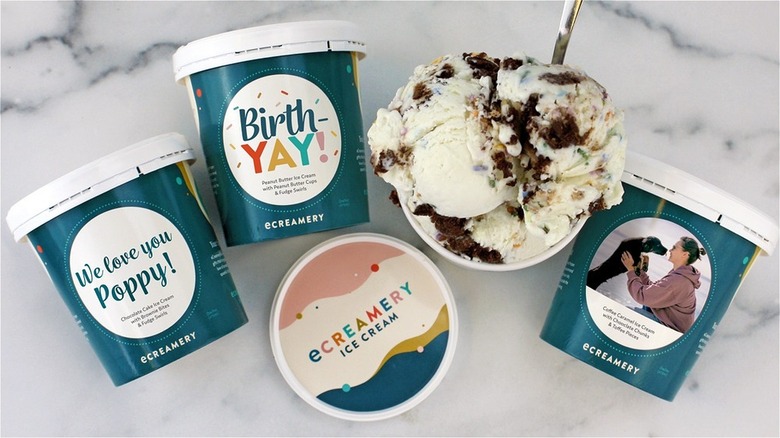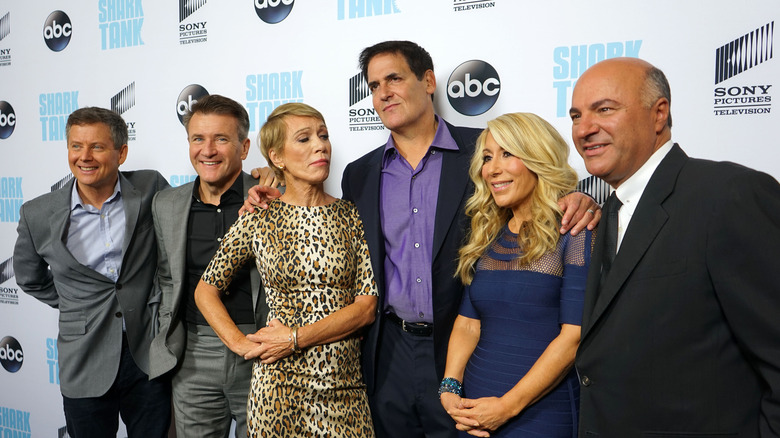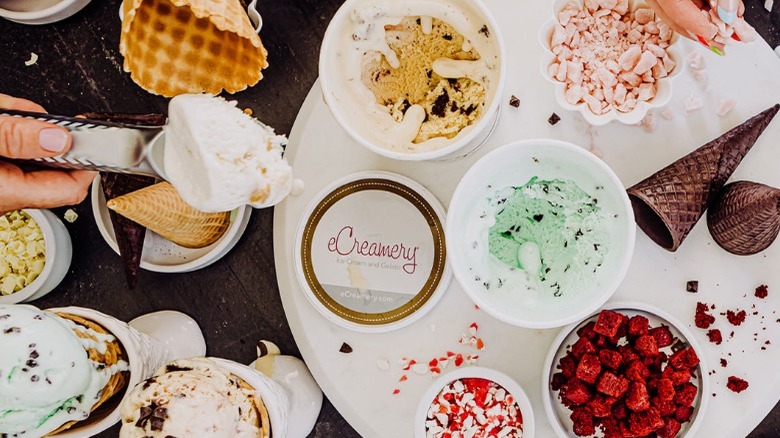Here's What Happened To eCreamery After Shark Tank
From candles and bathrobes to jewelry and coasters, there are lots of personalized gifts to choose from nowadays. Believe it or not, ice cream is also on the list of customizable treats to make for a loved one or yourself. Becky App and Abby Jordan made that possible by creating eCreamery, a company selling personalized ice cream gifts, in 2007. Before founding the brand, App worked as a marketing specialist at a luxury jewelry company, while Jordan worked as a marketing and corporate gift manager at a department store, according to SEOAves. Though neither had worked in food, their experience came in handy when it came time to start their own gift business.
eCreamery is an ice cream parlor based in Omaha, Nebraska, that not only serves scoops from the shop, but also allows customers to order custom gifts online by creating unique ice cream, gelato, or sorbet flavors with mix-ins, such as bacon and chocolate fudge brownies. Customers can then name their flavor and have their creation mailed to their door. App and Jordan had big ideas to catapult the gifting aspect of their business to the next level, which is why they sought help from the investors of "Shark Tank" back in 2013.
The Sharks decided to not invest in eCreamery
The creators of eCreamery appeared on "Shark Tank" in front of multimillionaire and billionaire investors Mark Cuban, Kevin O'Leary, Barbara Corcoran, Daymond John, and Robert Herjavec (via eCreamery). App and Jordan asked the Sharks for an investment of $250,000 in exchange for 33% equity in the eCreamery business. Each of the five investors received their own personalized pint of ice cream, with fun flavor names such as InvestMINT Mix for Herjavec, Delicious Dividends for Corcoran, Shark Bait for O'Leary, Fashionable Flavor Factory for John, and The Cubanero for Cuban. App and Jordan divulged some information about their ice cream business with the investors.
The company had made about $2 million since its founding, and the women estimated that their business would make $750,000 by the end of the current fiscal year, per Shark Tank Blog. Furthermore, a majority of the company's sales comes from online orders, with only 40% of sales coming from orders at the physical store location. At the time the episode aired, four pints of ice cream cost $55 plus shipping, which the customer paid for separately, and the pints were shipped on dry ice in reusable coolers.
In the end, O'Leary was the only investor who made an offer, proposing $125,000 with 25% equity on the condition that another investor joined him. No one did, so O'Leary withdrew his offer, and App and Jordan left the show empty-handed.
eCreamery has been thriving since the show
App and Jordan called their failure to get an offer "a gift in disguise," saying they "sold over $250,000 in ice cream gifts" in the two months after the show, making up the offer they had hoped to get from the Sharks.
These numbers surged even further, as the company was featured in a follow-up episode where App and Jordan said they sold about $1.5 million worth of product in the three months following the episode's air date, per eCreamery. The increased business allowed the women to hire additional chefs and call center staff to take orders, as well as increase their freezer storage space and begin funding a bigger facility for production (via SEOAves).
Though Corcoran and Cuban advised the duo to simplify their business, shutting down the physical store to focus on the online business, eCreamery's store remains open. In fact, they've added more elements to the business, such as an ice cream truck to cater events and a collaboration with Carson's Cookie Fix, another company from Omaha, to offer more desserts, according to Shark Tank Blog. The brand has upped its online prices to start at $69.99 for four pints and is also selling in various Omaha grocery stores, movie theaters, and restaurants. The duo had hoped to be "a $5 million business" by 2015, but as of 2022, the company is estimated to have made about $2 million in sales.


